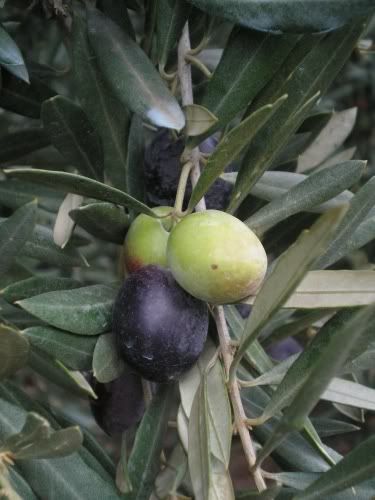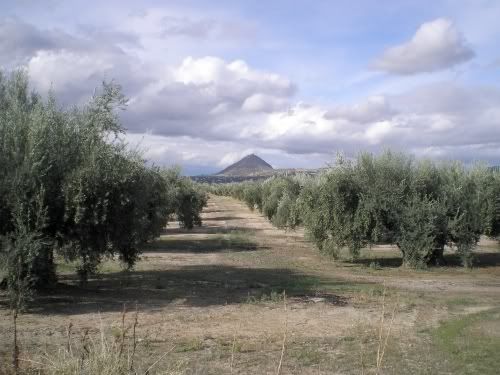Olives - trees and oil

Olive oil is extracted from the mature fruit of the European olive tree which originated in the Mediterranean area. It is used for cooking, cosmetics, and soap and as a fuel for lamps.
Olive trees are one of the longest living trees and can live longer than a thousand years. In Israel some of the trees are estimated to have been growing for more than two thousand years. Olive oil was used to anoint the kings of Israel in ancient times.
Not only long living but olive trees are the most resilient tree, having the ability to grow back when the tree appears dead. In 2005, arctic weather hit Jaen province in the south of Spain. It caused widespread damage to thousands of olive trees, many appeared dead. Today there is no evidence of any damage on those trees.
Spain is the world’s leading producer of olive oil, but most of the oil is exported to Italy where it’s bottled and exported. Italian olive oil has a high reputation but read the packaging it’s quite possibly Spanish in origin and “bottled in Italy”.
Traditionally olives were harvested by knocking them off the trees into large nets with long poles. Next they were crushed in wooden presses. These days there are mechanically shaken from the tree and ground to a paste with water then processed in a centrifuge to extract the oil from the paste.
Health benefits
Extra-virgin olive oil is especially good for us because of its high quantity of nutrients and natural vitamin E. The best and easiest way to eat it is as a salad dressing. The oil also makes a great substitute for butter or fats in cooking but remember it’s still fat and has 120 calories a teaspoon.
How oils are classifed
Extra-virgin oil is free from defects and can’t have had any chemical treatment or contain any refined oil. Its acidity level must be less than 1%.
Virgin oil cannot contain any refined oil and can be just as good as extra virgin perhaps less bitter in taste with a higher acidic content of no more than 1.5%
Refined means the oil has been chemically treated and refined to improve flavour or aroma.
Olive Oil is made with a mixture of refined and virgin oils and may be used for cooking.
Olive oil should be kept in a cool, dark and dry place and is best used in its first year. Light and heat can damage the oil, which can turn it rancid.
Christened “liquid gold” by Homer it’s a priceless addition to our diet, the extra virgin and virgin oils are one of nature’s original pure products.
Olive trees are one of the longest living trees and can live longer than a thousand years. In Israel some of the trees are estimated to have been growing for more than two thousand years. Olive oil was used to anoint the kings of Israel in ancient times.

Not only long living but olive trees are the most resilient tree, having the ability to grow back when the tree appears dead. In 2005, arctic weather hit Jaen province in the south of Spain. It caused widespread damage to thousands of olive trees, many appeared dead. Today there is no evidence of any damage on those trees.
Spain is the world’s leading producer of olive oil, but most of the oil is exported to Italy where it’s bottled and exported. Italian olive oil has a high reputation but read the packaging it’s quite possibly Spanish in origin and “bottled in Italy”.
Traditionally olives were harvested by knocking them off the trees into large nets with long poles. Next they were crushed in wooden presses. These days there are mechanically shaken from the tree and ground to a paste with water then processed in a centrifuge to extract the oil from the paste.
Health benefits

Extra-virgin olive oil is especially good for us because of its high quantity of nutrients and natural vitamin E. The best and easiest way to eat it is as a salad dressing. The oil also makes a great substitute for butter or fats in cooking but remember it’s still fat and has 120 calories a teaspoon.
How oils are classifed
Extra-virgin oil is free from defects and can’t have had any chemical treatment or contain any refined oil. Its acidity level must be less than 1%.
Virgin oil cannot contain any refined oil and can be just as good as extra virgin perhaps less bitter in taste with a higher acidic content of no more than 1.5%
Refined means the oil has been chemically treated and refined to improve flavour or aroma.
Olive Oil is made with a mixture of refined and virgin oils and may be used for cooking.
Olive oil should be kept in a cool, dark and dry place and is best used in its first year. Light and heat can damage the oil, which can turn it rancid.
Christened “liquid gold” by Homer it’s a priceless addition to our diet, the extra virgin and virgin oils are one of nature’s original pure products.
This site needs an editor - click to learn more!
You Should Also Read:
Read my other article on olives.
Related Articles
Editor's Picks Articles
Top Ten Articles
Previous Features
Site Map
Content copyright © 2023 by Rachel Webb. All rights reserved.
This content was written by Rachel Webb. If you wish to use this content in any manner, you need written permission. Contact
BellaOnline Administration
for details.



